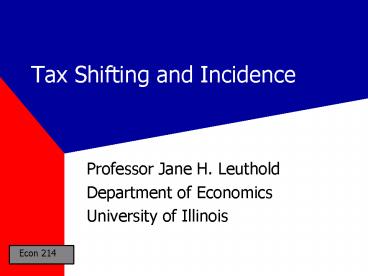Tax Shifting and Incidence - PowerPoint PPT Presentation
1 / 22
Title:
Tax Shifting and Incidence
Description:
University of Illinois. Econ 214. Topics for today. Who bears the tax burden? ... Is the lottery a progressive, proportional, or regressive tax? Soap Box ... – PowerPoint PPT presentation
Number of Views:1746
Avg rating:3.0/5.0
Title: Tax Shifting and Incidence
1
Tax Shifting and Incidence
- Professor Jane H. Leuthold
- Department of Economics
- University of Illinois
Econ 214
2
Topics for today
- Who bears the tax burden?
- Taxes on buyers compared with taxes on sellers
- Unit taxes compared with ad valorem taxes
- Tax shifting under monopoly
3
Tax incidence
- Tax incidence is the study of who really bears
the burden of a tax - statutory incidence
- economic incidence
- tax shifting
Shifting economic incidence - statutory
incidence
4
Types of shifting
- Forward shifting -- transfer of tax burden from
sellers to buyers - Example tax on cigarettes is shifted forward
from sellers (who are legally liable for the tax)
to buyers assuming demand is perfectly inelastic - Backward shifting -- transfer of tax burden from
buyers to sellers - Example payroll tax is shifted backward from
employers to sellers (workers) assuming labor
supply is perfectly inelastic
5
Unit tax on sellers
Price (P)
Is this tax shifted? What is its incidence?
S
Buyers
Pe
Sellers
D
Pizza (Q)
Qe
6
Tax shifting and elasticities
Price
S T
D
- The more inelastic the demand or elastic the
supply of the taxed commodity, the greater the
tax burden on the buyer.
S
T
PG
Buyers
PePN
Salt
7
Problem 1
Price per gallon
2.00
D
- Who bears the burden of a .50/gal tax on
gasoline, the buyer or the seller?
MC
1.00
200
100
Gasoline
8
Unit tax on buyers
ST
Price (P)
How would the incidence change if the tax were on
the buyer instead of the seller?
S
T
PG
Buyers
Revenue
Pe
Sellers
PN
D
Pizza (Q)
Qe
Q1
9
Problem 2
Price per gallon
- How would the incidence change if the tax were on
the buyer rather than on the seller?
2.00
D
MC
1.00
ANS Assuming a perfectly competitive market and
equal yield taxes, the incidence of the two taxes
would be the same -- on the buyer.
200
100
Gasoline
10
Tax principle
- In competitive markets, tax incidence is
independent of the legal liability for the tax - A unit tax on the buyer has the same effect on
price and output as an equal yield unit tax on
the seller - A unit tax on the buyer will be fully shifted
forward to the buyer if the demand is perfectly
inelastic or the supply is perfectly elastic.
11
Who bears the burden of the payroll tax?
S
Wage
D
The SS payroll tax is imposed equally on the
employer and employee.
We
Hours worked
12
Ad valorem taxes
Price
S(1.07)
- An ad valorem tax is applied to the value -- at
a rate. - Example retail sales tax
D
S
PG
Buyers
Pe
Sellers
PN
Q1 Qe
Sales taxed items
13
Ad valorem vs. unit tax
How would the incidence change if the tax were an
ad valorem instead of a unit tax?
S T
Price (P)
S
T
PG
Buyers
Pe
Sellers
PN
D
Pizza (Q)
Q1
Qe
14
Problem 3
Price per gallon
- What rate of ad valorem tax would be needed to
raise the same revenue as raised by the unit tax
on gasoline? - How would the incidence of the unit and ad
valorem taxes differ?
2.00
D
MC
1.00
ANS The rate of ad valorem tax would be .50.
The unit and ad valorem taxes would have the same
incidence on the buyer.
200
100
Gasoline
15
Tax principle
- In competitive markets, economic tax incidence
does not depend on whether the tax is a unit tax
or an ad valorem tax - Equal yield unit and ad valorem taxes will have
the same effect on price, quantity, and excess
burden
16
Shifting under monopoly
- A monopolist would shift less of a given unit tax
forward to the buyer than would be the case if
the output were produced by a competitive
industry. PMT - PM lt PCT - PC
Price
ST
PCT
S
PC
DAR
QCT
Output
QC
17
Problem 4
Price per gallon
- How would the incidence of this tax change if
there were a single seller of gasoline?
2.00
D
MC
1.00
ANS Under perfect competition, there is full
forward shifting. Under monopoly, only half the
tax is shifted forward to the buyer.
200
100
Gasoline
18
Tax shifting in the US Best guesses
- Income taxes are borne by taxpayer.
- Payroll taxes are borne by labor.
- Corporate taxes borne by shareholders.
- Consumption taxes forward shifted to consumers.
- Wealth taxes borne by the holder of wealth.
19
Taxes and income distribution
- Studies of the US tax system show that taxes
reduce the Gini coefficient only slightly. - Would you conclude that US taxes are progressive,
proportional or regressive?
100
Line of Equality
Cumulative of income
A
B
100
Cumulative of families
20
Application The State Lottery
Is the lottery a progressive, proportional, or
regressive tax?
P
D
The amount spent per household on lottery tickets
does not vary much with income.
MC
State Lottery Revenue
State Profit per Ticket
MC of operations
Lottery Tickets
21
Soap Box
For the Soap Box this week, let's hear it on the
issue of a tax free Internet. Do you think
Internet sales should be free from sales taxation
and tariffs? Try to make a good economic
argument either for or against taxing Internet
sales.
22
Next time
Thursday Consumption and Sales Taxes Ch
16 Papers due Thursday November 30































